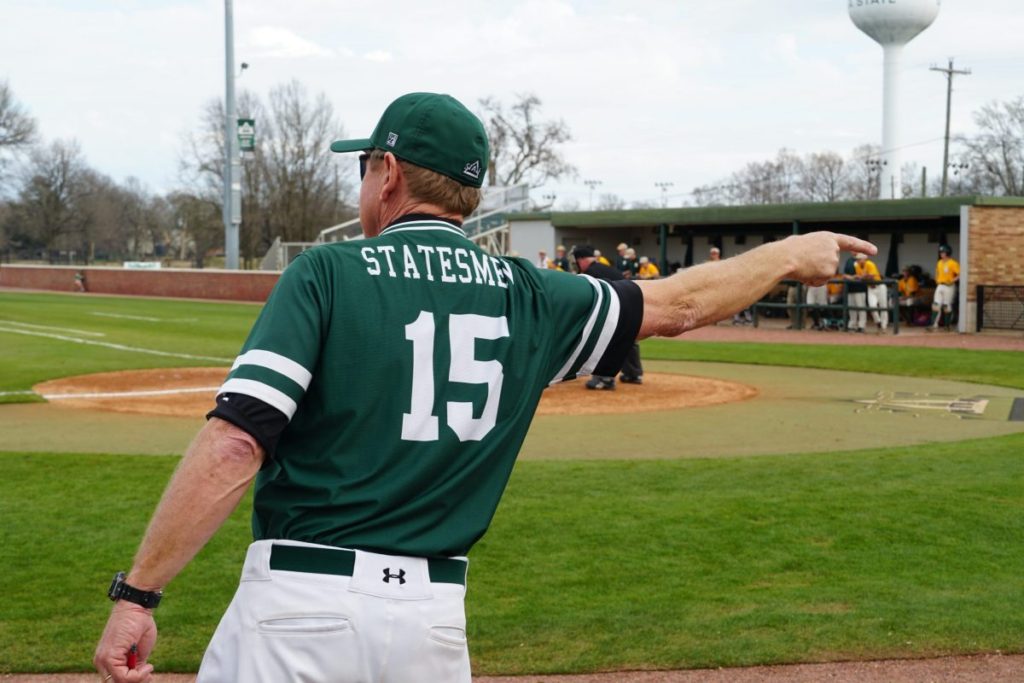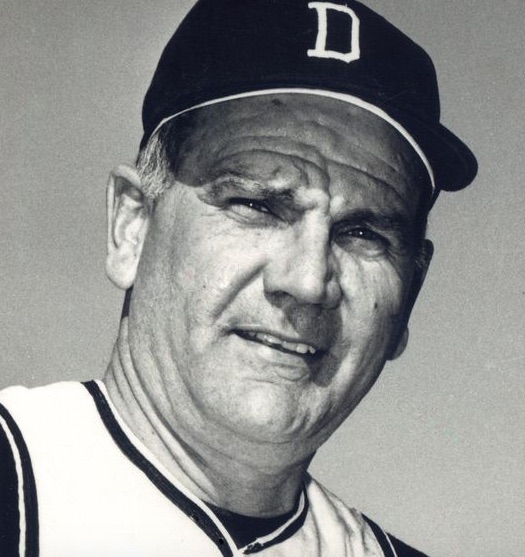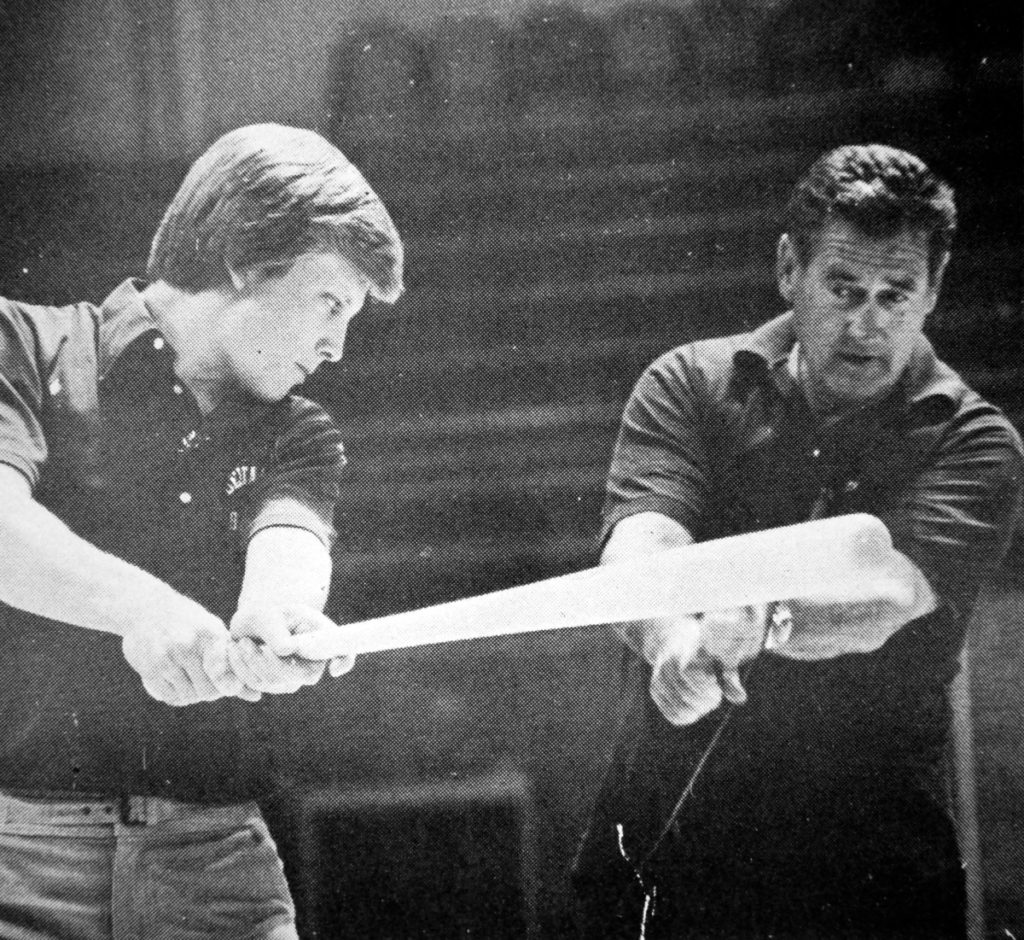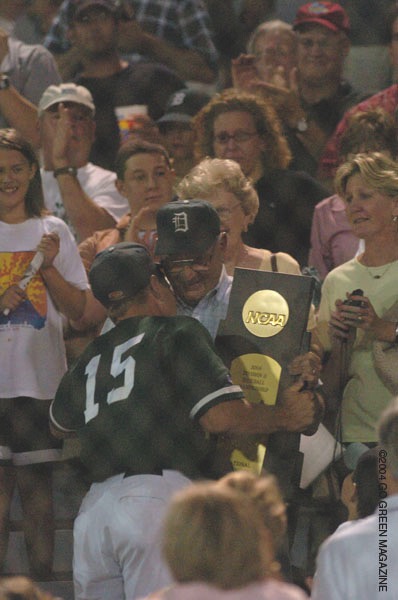Delta State retires Kinnison’s jersey; they’ll never retire his remarkable story
Posted on: April 26,2021

This article first appeared on mississippitoday.org and was written by Rick Cleveland.
Author’s note: Delta State University will retire former head baseball coach Mike Kinnison No. 15 jersey in a ceremony Saturday at Harvey Stadium-Ferriss Field prior to the 2 p.m. doubleheader against the University of Alabama-Huntsville.
Kinnison guided the Statesmen to the 2004 NCAA Division II national championship, six College World Series appearances and 15 NCAA South Regional appearances. His Delta State teams won 981 games, while losing only 313 for a 75.6 win percentage. He averaged 42.5 victories per season.
The story of Kinnison’s journey from team manager, to All-American shortstop, to national championship coach was detailed in Mississippi Today columnist Rick Cleveland’s 2008 biography of Boo Ferriss: “Boo: A Life in Baseball, Well-Lived.” That chapter follows:
The most succinct and telling way to describe Mike Kinnison’s success as Delta State’s baseball coach is this: No coach at any level of NCAA baseball – ever – has won a higher percentage of his games. In college baseball 40-win seasons are considered the gold standard. Kinnison’s teams routinely win 50 games.
The story of how Kinnison, the hard-working son of a Yazoo County farmer, found his way to Delta State and eventually came back to his alma mater is worth telling and re-telling. As you might guess, Boo Ferris is a huge part of the story. The two form a two-man mutual admiration society.
Kinnison first met Boo Ferris when Ferriss spoke at the Benton Academy athletic banquet Kinnison’s senior year of high school. “Coach made such a strong impression, not just about baseball and sports but about life and planning for your future,” Kinnison said decades later. “That was in 1973 and I remember thinking even then that Coach Ferriss would be a great person to play for.”
But Kinnison was not college baseball material at that point. A late bloomer, he spent his first two years out of high school at Holmes Community College where he played football and baseball as a freshman and basketball and baseball as a sophomore.

“Baseball was what I loved,” Kinnison said. “I asked my coach to put in a word for me at Delta State. He said he would call Coach Ferriss.”
Ferriss promised Kinnison a chance to walk on and try out.
“So I went to Delta State and registered and showed up for the first baseball meeting, and Coach told us we would have open tryouts,” Kinnison said. “I looked around and saw about 70 guys there and that’s when it dawned on me that I was a little bitty fish in great big pond.”
Making matters worse, Kinnison had spent the previous summer away from baseball. He needed money to pay his tuition, so he worked off-shore on an oil rig. You can’t take much batting practice in the Gulf of Mexico. Kinnison was more than a little rusty when he arrived at Delta State.
“Delta State was a much more advanced program than anything I had ever seen,” Kinnison said. “I’ll give you an example. I had never in my life hit off a pitching machine. Anybody who has ever played baseball will tell you how different that is. I don’t think I impressed anybody. Coach gave me an extended look, but I just didn’t do enough.”
Said Ferriss, “We had a veteran team coming back. We were loaded. I just didn’t have room for Mike. I loved everything about coaching except for cutdown day. I hated telling a boy that he couldn’t play the game he loved. I just hated that part of it.”
“I was devastated,” Kinnison said. “It was the first time I had ever been told I wasn’t going to be able to play ball. Coach caught me between classes and asked me to come to his office. Well, I knew what was coming. He was as thoughtful and polite as he could be, thanking me for my effort. I’ll never forget him saying that I came up a little bit short – just a little bit short, he said – and he wasn’t going to be able to keep me. I’m not going to lie to you. It hurt. Man, it hurt. I just couldn’t imagine life without baseball.”
Kinnison had pretty much resigned himself to just that. Then, a week later, he was walking from one class to another when Ferriss drove by and then pulled over to the side of the road.
“Coach asked me how things were going and then he told me had some spots for people top help him and that there was some scholarship money involved,” Kinnison said. “He was talking about being a manager, and he told me to get back to him.
“Well, I didn’t have any intention of doing that. It was a pride thing. But I kept thinking about it and I knew I was going to have to get a job any way to help pay for school. He was offering some money. I had to work somewhere and I decided to take the job as a manager. That decision was the turning point in my life.”
Instead of fielding ground balls, Kinnison smoothed the infield so others could. Instead of taking batting practice, Kinnison shagged balls for others. Instead wearing a baseball uniform, Kinnison washed them.
“I won’t sugar-coat it,” Kinnison says. “It wasn’t any fun watching those other people play. As a manager, you do whatever needs to be done. It was great preparation really, although I didn’t look at it that way at the time. I learned how to work on the field. I learned about the science of growing grass, the different chemicals you use. I saw the pride Coach had in the field and how it looked. And I can tell you what else I learned. I learned to appreciate the managers and support people.
“I’d sneak in the cage and hit when nobody else did,” Kinnison continued. “I’d shag guy balls during the batting practice. The biggest thing is I saw the mental and physical maturity you had to have to play at that level. By then, I pretty well knew I wanted to coach some day, and I knew I was at the footsteps of a master.
“I learned so much about strategy and how you handle players and pitchers. I remember Coach telling men that the people on the bench are the ones you have to spend time on. Those out on the field are involved in the game. You have to spend time with the ones who aren’t in the game, make sure they stay interested and focused. I’ve never forgotten that. Coach is still the best I’ve ever been around at the strategy of the game, about having a feel for different matchups, when to use certain players.”
Kinnison was like a sponge. He soaked it all in – all that and more.
“I can remember we’d be on a road trip and Coach would pull over some place and go in and spend five minutes with somebody to thank them for something they had done for the program,” Kinnison says. “He’d always remember to take every opportunity to stay thank-you. He told us you can never say thank-you too much.”
Whether he knew it or not, Kinnison was making an impression on Ferriss, too. “Mike was one of the best managers I ever had,” Ferriss says. “He was a worker and he was smart. Man, he’s smart. But the main thing is he worked. You never had to tell him twice to do anything.”
Kinnison remembers that Ferriss never failed to thank him for all that work. “More than once he’d come up to me as I was finishing washing and drying and hand me a 20 dollar bill,” Kinnison says. “He’d tell me, ‘Go eat a steak tonight. You earned it.’”
Kinnison also earned a nickname that spring as a manager. Whenever it came time to rake the infield dirt, Ferriss would call it “scratching” – as in, “Mike go out there and scratch around first base where it’s wet.”
One time, Kinnison mumbled under his breath that he was sick and tired of that word “scratch” and that he hoped he never heard it again. One of the graduate assistant coaches heard him and jumped on it. Mike Kinnison became “Scratch” Kinnison.
But that summer Scratch Kinnison played semipro baseball with a team in Greenwood that included several Delta State players. He worked out regularly, too, doing hundreds and hundreds of pushups and swinging a heavy bat regularly. The work paid off.
He got bigger, stronger. His line drives became gappers. He did so well that reports filtered back to Ferriss. Still, Kinnison figured that when he went back to school, he would be going back to be a manager.

Ferriss had other ideas, as he explained years and years later. “I’ll never forget where I was sitting when I made the decision, right here in the living room,” Ferriss said. “I told Miriam (his wife), I said, ‘I’m going to give Mike a shot. He’s earned it. I think he can help us.’”
The next morning Ferriss called Kinnison and told him to meet him at the field. “Mike came over and jumped out of his car like he was ready to work on the field,” Ferriss said, smiling at the memory. “He said, ‘What do we need to do Coach?’”
Ferriss put his arm around Kinnison’s shoulder, pulled him close and told him: “From now on you’re not a manager, you are a player. I think you can help us, and I know you will work hard.”
Kinnison cried that day. More than a quarter century later, tears welled in his eyes as he told the story.
“At 1:30 that afternoon, Mike was the first one on the field,” Ferriss said. “He hit the ground running and he hasn’t stopped since. He helped us win, and he’s still winning.”
In those days, Delta State players were able to order their gloves from a company at a discount. Kinnison didn’t have the money to order a glove, but when the shipment of gloves came in, Ferriss handed one to Kinnison and told him, “You can pay me back some day.”
Says Kinnison, tearing up again, “You don’t forget things like that.”
It is an amazing, inspiring story – the stuff Hollywood makes up. The team manager became the team’s star. He cracked the lineup, first in right field, then second base and finally shortstop.
“Mike lived in the batting cages,” Ferriss said. “He made himself into a player. Heck, he led the nation in doubles.”
Kinnison helped the Statesmen reach the College World Series both his junior and senior seasons. He made All American as a senior in 1978 when he batted .343 with 25 doubles and 56 runs batted in, leading DSU to a second place finish. In the national semifinals, Kinnison knocked in the winning run off future Atlanta Braves closer Steve Bedrosian to send the Statesmen into the finals.
Most coaches will tell you the third spot in the batting order is where you put your surest hitter. Mike Kinnison batted third his entire senior season. He never came out of a game.
“There were a lot of games where he got way ahead of the other team, and Coach would substitute almost an entirely new lineup,” Kinnison said. But he never took me out, not once. He never said so, but I always felt like he was saying, ‘Son, you’ve sat enough.’”
It was at about that time Kinnison told Ferriss he wanted to be a coach. Says Ferriss, “I knew for certain Mike would be a good one.”
Ferriss took a keen interest in the post-college lives of all his players. Kinnison was no exception. A math scholar at Delta State, he became a high school coach and math teacher. Ferriss followed his career closely.
“No matter where I was coaching, it wasn’t anything to see Coach pull up in his car at a game or even a practice,” Kinnison says. “If he couldn’t stop by, he’d always call. And he wasn’t doing that just for me. He was doing it for so many of his guys who have gone into coaching. Now I’m a coach and when I think about how he did that it’s just mind-boggling.”
Kinnison coached in the high school ranks at Lee Academy, Jackson Prep and Madison Central. His teams won three state championships and nearly 80 percent of their games. In 1994, he returned to Delta State as an assistant coach to another former Delta State player, Bill Marchant. Marchant had been paralyzed from the chest down in an automobile accident but courageously continued to coach for three seasons with Kinnison’s help. Marchant and Kinnison guided the Statesmen to an impressive 138-36 record and two College World Series berths in those three seasons.
Then Kinnison took over as head coach and Delta State got even better. Says Ferriss, “Mike Kinnison is the best coach I have ever seen at any level of the sport. I don’t care where you put him, he would be successful. He’d be successful because he’s so smart and he works at it so hard.”
Kinnison will tell you he has made one mistake since he returned to Delta State.
“At first I tried to be just like Coach Ferriss,” Kinnison says. “I tried to keep up with every player’s family, the brothers, the sisters, all the birthdays and everything Coach has always done. I finally figured out I couldn’t do it. That’s not me. That’s Coach Ferriss and that’s why he’s special,”
In fact, Kinnison is a distinctly different coach that Ferriss, much more intense, much more fiery than the man who taught him so much about the game.
Despite all the success both men enjoyed – and Marchant as well, for that matter – there remained a huge void in the baseball trophy case until May of 2004. Despite winning so many games, so many conference titles and so many NCAA regionals over the years, Delta State still lacked the biggest trophy, the one that goes to the national champion.
“We had come so close many times, I was beginning to wonder,” Ferriss said. “But I knew if anybody could win one, Mike Kinnison would.”
Judson Thigpen had been one of Kinnison’s Delta State teammates and one of Ferriss’s top pitchers. Jud Thigpen, Judson’s son, was the national player of the year, the centerfielder on that 2004 team. Jud Thigpen helped the Statesmen overcome a five-run deficit in the semifinal game and play their way into the championship game against Grand Valley State.
The next day’s Clarion Ledger described the scene this way:
MONTGOMERY — Forty years ago, 42-year-old Boo Ferriss carved a baseball diamond out of a Delta bean field. He had a vision: Delta State would have baseball program second to none.
Here Saturday night, Ferriss watched through tears as his dream was realized. “I don’t cry much,” Ferriss said. “I couldn’t help myself tonight.”
He was not alone. The movie Field of Dreams had nothing on this real-life scene from old Paterson Field:
Delta State’s Scott Ellison strikes out the final batter to clinch Delta’s 12-8 national championship victory over Grand Valley State. Green-jerseyed Delta players charge toward Ellison and pile on one another, creating a human mound on top of pitcher’s mound. Coach Mike Kinnison, national championship trophy in hand, vaults over the dugout and then climbs a few rows up into the grandstand where he presents the trophy to Ferriss, his former coach, who has big tears running down his face.

“That wasn’t meant to be showy,” Kinnison would later say. “That was spontaneous, just the way I felt, and I think the way everybody who knows anything about Delta State feels about Boo Ferriss. He’s Delta State baseball. He’s the guy who laid the foundation. He’s the one who built the program to what it has become and he’s still there today, doing anything and everything he can to make it better.”
A modest crowd of 2,428 watched Delta State finally win a national championship after eight previous trips to the World Series. Probably 2,000 were Delta State fans. A hundred or more were former Delta State players.
“I told our guys before the game that they were playing for everybody who has ever worn this Delta State uniform,” Kinnison said. “I want everybody who has ever worn this uniform to enjoy this tonight.
“We’ve had so many good teams that have achieved so much, but we’ve always come up short before. We’ve been here a few times, and we’ve always left disappointed. This has been a long time coming and I want everybody to enjoy it.”
Delta State fans stayed in the stands and celebrated long after the game. More than an hour later, guys like Barry Lyons and Chris Burgess couldn’t talk about what had transpired without choking on their words.
Lyons, a former Major Leaguer, tried. “Delta State baseball is special,” he said. “We all know we are part of something very special and we all know who made it that way. I’m like everybody else. I’m happy for me. I’m happy for the program, but I am happiest for Boo Ferriss. He, more than anyone, deserves this moment.”
Two years later, Kinnison talked about what the championship had meant to him and why.
“That night I just felt like I had the chance to do what every player who has ever come through the program would want to do if he had a chance,” Kinnison said. “It was spontaneous, but I’m not going to tell you that I hadn’t thought of some day handing him a national championship trophy because I had.
“You know, we saw it every day as players under him,” Kinnison said. “He taught us so much about baseball, but he taught us more about how to live our lives. He talked about being polite, saying thank-you, giving it your best, but, more importantly, we saw it all in him. We saw the way he lived his life, the way he treated people. That was the most important lesson he taught any us.
“I think about this all the time. Coach could have just driven on by me that day, but he stopped. And it changed my life.”




